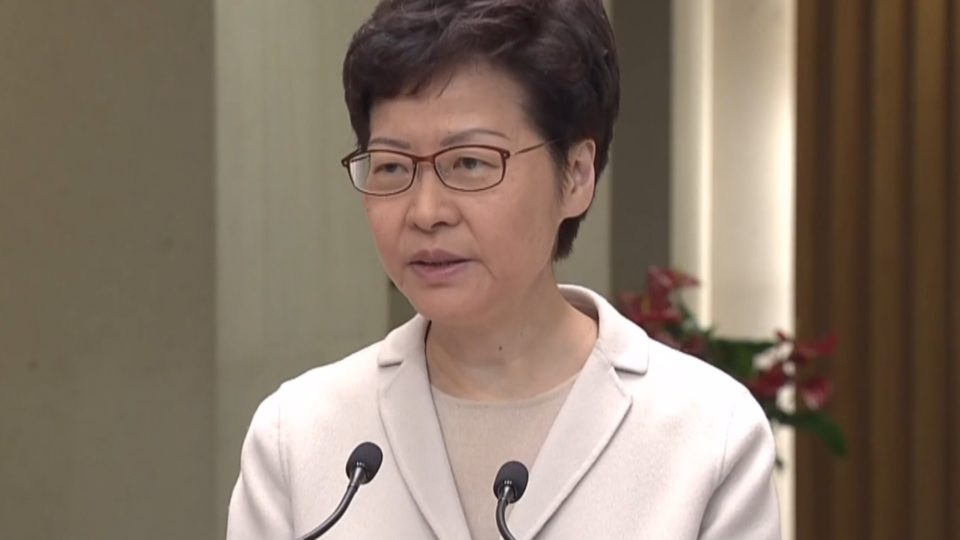Hong Kong’s deeply unpopular leader Carrie Lam acknowledged Tuesday that public dissatisfaction with her government played a part in a landslide win by pro-democracy candidates in local elections, but appeared to downplay the significance of the result, saying it was an expression of a variety of views, while offering no new concessions to resolve months of violent protests.
In China, state media similarly sought to downplay and discredit the weekend ballot, which delivered a stinging rebuke to the city’s pro-Beijing establishment in what was widely seen as a referendum on Lam’s handling of the unrest.
The city’s chief executive pledged to “improve governance” in the wake of the district council elections, which she acknowledged revealed concern over “deficiencies in the government, including unhappiness with the time taken to deal with the current unstable environment.”
However, she also took pains to note that voters could have taken to the polls in record numbers to express their desire — as mainland media have suggested — to “end the violence.”
At the same time, Lam also rejected the characterization of the result as a referendum on her leadership when pressed by reporters.
“The nature of these elections is simply to elect district council members to serve on the 18 district councils. It is not for the government and myself to give it another interpretation,” she said.
In a rout that stunned the semi-autonomous territory, candidates campaigning against greater control by China seized an overwhelming majority of the 452 elected seats in the city’s 18 district councils, bodies that have historically been firmly in the grip of the Beijing-aligned establishment.
The result — the first vote held since protests engulfed the city — was a humiliating rebuke to Beijing and Lam, who has dismissed calls for political reform and repeatedly suggested that a silent majority supported her administration.
In the wake of the polls, pro-democracy politicians have stepped up calls for Lam to address the movement’s key demands — such as direct popular elections for the city’s leadership and legislature, and a probe into alleged police brutality against demonstrators.
The public support for change indicated by the election result appeared to pour cold water on repeated claims by the chief executive and China’s government that the protests were the work of a violent radical fringe.
But in Tuesday’s weekly press briefing, Lam sidestepped those calls, denouncing the street violence and repeating an earlier pledge to open a dialogue on the unrest, a proposal that opponents have dismissed as too little, too late.
Lam’s latest comments indicated “no reflection, no response, and no resolution” for Hong Kong’s ongoing crisis, said Lam Cheuk-ting, a lawmaker and leading figure in the Democratic Party, the city’s largest anti-establishment party.
“While the pro-establishment camp was finally awakened by votes, Lam still chooses to remain asleep, as deeply as in a coma,” he said.
China’s state media, however, cast doubt on the vote’s legitimacy, focusing on violence that marred campaigning.
The People’s Daily said “social unrest… has seriously disrupted the electoral process,” with an editorial in the English-language version of the China Daily saying it was “skewed by intimidation” and “dirty tricks” that hurt pro-establishment candidates.
“External forces that have helped stoke the months-long anti-government campaign in [Hong Kong] also contributed greatly to damaging the election chances of pro-establishment candidates,” it said, apparently alluding, as the mainland long has despite a lack of evidence, to foreign interference in the city’s affairs.
While violence did indeed mar the campaign period, the vast bulk of it was directed at pro-democracy candidates, several of whom were attacked in the weeks leading up to the poll. The only prominent pro-Beijing candidate to be similarly attacked was infamous firebrand Junius Ho.
This week’s election result revived speculation that Lam might be dumped by Beijing, but a Chinese Foreign Ministry spokesman on Monday reiterated the government’s backing.
Questioned over whether China’s leaders had asked her to take responsibility for the rout, Lam said she had received such no communications from Beijing.
Additional reporting by Coconuts HK.




